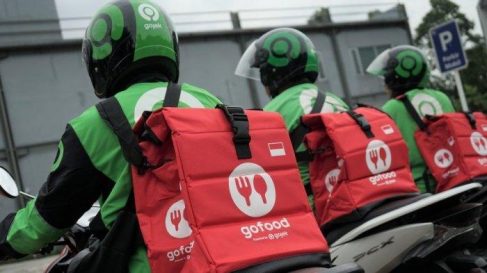LD FEB UI Research: 64 Percent of GoFood Partners in Yogyakarta Joined Due to the Pandemic
DEPOK – (21/10/2020)
The latest research by the Demographic Institute of the Faculty of Economics and Business, Universitas Indonesia (LD for short) entitled “The Role of the Gojek Digital Ecosystem in the Yogyakarta Economy Before and During the Covid-19 Pandemic” mentioned that GoFood was an economic buffer in Yogyakarta City for those whose income was affected by the pandemic, especially private and professional workers.
In the research, 95 percent of GoFood’s partners were micro-scale entrepreneurs.
Interestingly, 64 percent of GoFood partners who just joined during the Covid-19 pandemic (joined March – June 2020), chose to join because of the pandemic.
Furthermore, 43 percent of the partners who joined during the pandemic were entrepreneurs who started doing business for the first time.
The majority of GoFood partners in Yogyakarta (94 percent) felt that being a GoFood business partner helped them to adapt in running their business and survive during the pandemic (88 percent).
Specifically, GoFood partners in Yogyakarta felt that Gojek’s technology features (86 percent), training and information support (78 percent), and other assistance from Gojek (74 percent) helped their efforts to survive the pandemic.
Furthermore, the majority of Gofood partners in Yogyakarta plan to continue their long-term partners with Gojek (95 percent).
They are also optimistic that together with Go-Jek, their business will continue to grow (89 percent), return to the same income as before (90 percent), and be able to provide for themselves and their families (87 percent).
Dr. Alfindra Primaldhi, LD researcher, said that from the results of this research, it can be concluded that the economic resilience in Yogyakarta City during the Covid-19 pandemic was able to be supported by Gojek’s digital economy ecosystem.
“The technology and non-technological solutions offered by the Gojek digital platform help small, micro and medium enterprises (MSMEs) in Jogjakarta adapt so that they can survive the Covid-19 pandemi, and remain optimistic about growing in the future. One of them is through the ease of migrating MSMEs from offline to online, or accelerating UMKM to go digital, “said Dr. Alfindra in his official statement, Monday (19/10/2020).
Dr. Alfindra continued by saying that the research shows the importance of the role of the digital economy ecosystem in helping MSMEs, especially micro businesses, to survive during the pandemic.
Pandemic conditions certainly test the resilience and adaptability of business players in times of crisis. One of the adaptations is a change in business from a traditional one to a digital one.
From this research, it appears that business actors are quite realistic in seeing the long effects of the pandemic. However, they also remain optimistic that by being in a digital ecosystem, their businesses can continue to grow in the future, and their income will return to what it was before the pandemic.
The LD research on driver partners in Yogyakarta also revealed that the majority of driver partners (88 percent) received assistance from Gojek during the Covid-19 pandemic and they appreciated this assistance (86 percent).
Driver partners are also optimistic that their income will return to what they were before (76% percent). They are also optimistic that their partnership with Gojek can meet the needs of themselves and their families (80 percent).
The majority of driver partners (91 percent) plan to continue their long-term partnership with Gojek.
Research by LD also shows that there is a spirit of mutual cooperation in the Gojek ecosystem in Yogyakarta, the elements in this ecosystem are helping each other in the midst of a pandemic. Nearly half of driver partners (49 percent) provided social assistance during the pandemic including to fellow partners. GoFood partners also carry out the spirit of mutual cooperation.
The majority of GoFood partners (70 percent) in Yogyakarta provide social assistance, more than a third of GoFood partners provide social assistance to online motorcycle taxi drivers (39 percent), both those delivering food and those on the roadside.
Dr. Paksi CK Walandouw, Deputy Head of LD, continued that in 2019 the contribution of Gojek partners from five services (GoRide, GoCar, GoSend, GoFood and GoPay) to the Indonesian economy reached Rp. 4.4 trillion using the added value method.
Meanwhile, using the gross regional domestic income (PDRB) method, the Gojek digital ecosystem has a production value of Rp. 7.6 trillion or contributes to 5 percent of Yogyakarta City’s PDRB.
At the national level, before the pandemic, Gojek partners from five services (GoFood, GoPay, GoSend, GoCar and GoRide) contributed IDR 104.6 trillion to the Indonesian economy in 2019.
When using the gross domestic income (GDP) calculation method, the value of production in the Gojek digital ecosystem during 2019 is equivalent to 1 percent of Indonesia’s national GDP.
Not only does Gojek impact MSMEs within the Gojek ecosystem, MSMEs outside the Gojek ecosystem, such as providers of raw materials in the market and vehicle repair shops also benefit from the presence of Gojek.
Source: https://jogja.tribunnews.com/2020/10/21/riset-ld-feb-ui-64persen-mitra-gofood-di-yogyakarta-bergabung-karena-terdampak-pandemi
(am)

